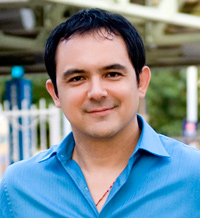 I have just learned of a $2.45 million settlement between the City of Los Angeles and lawyers representing the nearly 300 people who were arrested at the Occupy Los Angeles protests during the 2 am hour of Nov. 30, 2011. I was one of them. I understand this means I may receive some money from the city. This would be a form of justice for two reasons: (1) the ordeal detailed below, and (2) Lord knows I’ve paid the City of LA enough money in parking tickets. This is the account I wrote a few days after my release from jail, with photos I shot with my phone. That first one — click to enlarge — was shot moments before I was arrested as a wall of militarized police marched toward me.
I have just learned of a $2.45 million settlement between the City of Los Angeles and lawyers representing the nearly 300 people who were arrested at the Occupy Los Angeles protests during the 2 am hour of Nov. 30, 2011. I was one of them. I understand this means I may receive some money from the city. This would be a form of justice for two reasons: (1) the ordeal detailed below, and (2) Lord knows I’ve paid the City of LA enough money in parking tickets. This is the account I wrote a few days after my release from jail, with photos I shot with my phone. That first one — click to enlarge — was shot moments before I was arrested as a wall of militarized police marched toward me.
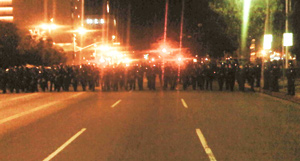 Human beings do not soon forget encounters with law enforcement. Officers with lethal weapons empowered to take away your freedom are going to leave an impression, even on a routine traffic stop, and all the more so during incidents where there are thousands of confrontations and hundreds of arrests.
Human beings do not soon forget encounters with law enforcement. Officers with lethal weapons empowered to take away your freedom are going to leave an impression, even on a routine traffic stop, and all the more so during incidents where there are thousands of confrontations and hundreds of arrests.
During my detention following the Los Angeles Police Department (LAPD) raid on the Occupy LA camp at LA City Hall, I was charged with a crime (failure to disperse from an unlawful assembly) for the first time in my life. I came into contact with dozens of police officers, sheriffs deputies, and detention officers. Some left a positive impression on me; some not so positive. Most of my time in jail was spent talking to Occupy LA protesters and their supporters who, like me, got swept up in the November 29, 2011 raid.
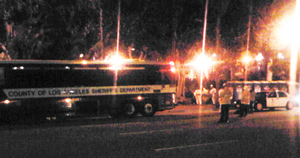 I had no intention of getting arrested. In fact, I took steps not to be arrested so that I could document the event from start to finish. As it turned out, I watched the police raid wind down from the LA County Sheriffs Department bus you see in a photo below, which I shot hours earlier with no idea I’d soon be locked inside it.
I had no intention of getting arrested. In fact, I took steps not to be arrested so that I could document the event from start to finish. As it turned out, I watched the police raid wind down from the LA County Sheriffs Department bus you see in a photo below, which I shot hours earlier with no idea I’d soon be locked inside it.
On a night when 292 people were arrested, the dozen or so who were arrested with me were probably the most surprised by the occurrence. We were not inside the Occupy camp, which by all reports was the target of the raid. We were on 1st Street about 80 yards away in what looked to be an area from which to observe and/or express disapproval of what was happening inside the park. The park that had been occupied for the past two months was on the southern side of Los Angeles City Hall. Many of the Occupiers who intended to be arrested were seated at the center of the camp surrounding a symbolic tent that had been placed there shortly after hundreds of officers had stormed in to establish control of the space. There had been a few arrests as the officers established their spider web of lines and circles crisscrossing park. I saw recycling bins and tents violently abused by officers who, either disliked camping gear or wanted to exhibit power in order to discourage anyone from challenging them physically. I did not see any protesters so much as motion aggressively toward police, and, I did not see any police act aggressively toward protesters, at least not in the park.
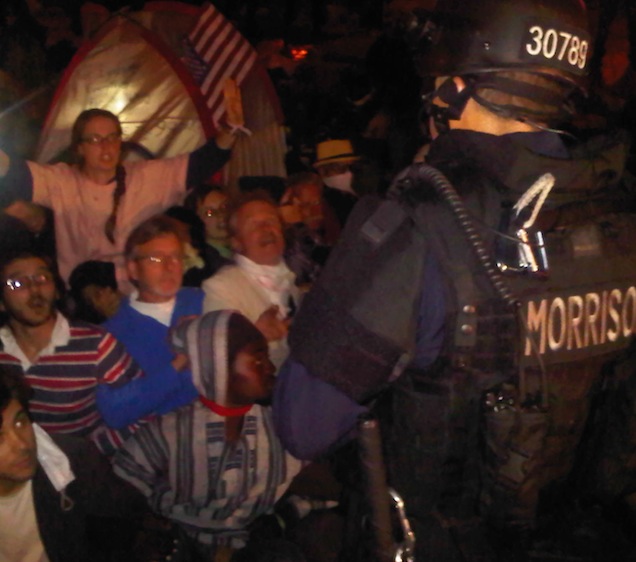 As I reported in my live tweeting, the raid unfolded in stages. Warnings were issued intermittently via megaphone, stating that we were being ordered to disperse from what had been declared an unlawful assembly. One in particular, Officer Brian Morrison, went to great lengths to communicate to the seated protesters the danger of being trampled in the event of widespread panic. Officer Morrison addressed the growing cluster of occupiers at the center of the park to ask if anyone was elderly or had trouble ambulating. One man explained that he did, but I did not see what happened to him or how he was treated. At first, the seated protesters had used The People’s mic to amplify Officer Morrison’s words: they would shout in unison to repeat each of his sentences. But after about 1 minute of this, he said, “Okay, I have a loud voice so just let me talk. There are a lot of you here, so we’re going to be here for a long while. If at any point one of you decides you want to be escorted out of here safely and peacefully, raise your hand to get my attention.”
As I reported in my live tweeting, the raid unfolded in stages. Warnings were issued intermittently via megaphone, stating that we were being ordered to disperse from what had been declared an unlawful assembly. One in particular, Officer Brian Morrison, went to great lengths to communicate to the seated protesters the danger of being trampled in the event of widespread panic. Officer Morrison addressed the growing cluster of occupiers at the center of the park to ask if anyone was elderly or had trouble ambulating. One man explained that he did, but I did not see what happened to him or how he was treated. At first, the seated protesters had used The People’s mic to amplify Officer Morrison’s words: they would shout in unison to repeat each of his sentences. But after about 1 minute of this, he said, “Okay, I have a loud voice so just let me talk. There are a lot of you here, so we’re going to be here for a long while. If at any point one of you decides you want to be escorted out of here safely and peacefully, raise your hand to get my attention.”
It was a few minutes later than another officer offered me the same deal. I took it, and was one of the last to leave the park before police closed in on the 60 or so protesters who, by then, all had their arms locked at the elbows as a method of prolonging the occupation just a little bit longer. The officers were going to have to yank them apart in order to handcuff them. It was not going to be pretty.
I was escorted southward through the park, winding through the hundreds and hundreds of officers who were basically standing guard over every inch of grass and concrete. Soon, people would be arrested, not only in the circle I mentioned, but also in tents and in trees. The officer left me on the other side of Main St., at the northeast corner of 1st and Main, where about 10 journalists had set up to shoot video or stills. To the west we could see the camp with its veins of sidewalks, all lined with police officers, and the concentric circles of officers surrounding the seated protesters. To the east we could see a crowd of onlookers and protestors pressing up against a scrimmage line of officers standing shoulder-to-shoulder along the eastern crosswalk of the intersection. Many of them were occupiers who had been in the camp and then chosen to leave to avoid being arrested. They were not allowed to go on the sidewalk, and kept on 1st Street by scrimmage lines that spanned the entire block. During the next half hour or so, I witnessed the arrival of scores of civilians coming from the west and the south. Protester reinforcements, I thought to myself as I shot photos. The protesters and onlookers who were already on 1st Street greeted them with cheers and a brief chant of “Join us! Join us!” I assumed that this meant that all streets leading to City Hall were no longer barricaded by police, as they had been all evening, but I later learned that the barricades were still in place, only they were increasingly undermanned as officers were being called into the park. During my time in jail, a man told me of a crowd of people being held blocks away from the action by only six police officers. He said they had looked at each other and said, “Hey, theres 100 of us and only 6 of them, lets go for it. Most of us will make it.” And, clearly most of them did.
Shortly before I was arrested, a police officer noticed me taking pictures with a less-than-professional camera (I was not traveling with my video camera, as I often do, mostly because of airline baggage fees). The officer asked me for my press pass and I said that I had none, but that I was a documentary filmmaker and a citizen journalist. I offered to show him my Directors Guild of America card but he said it wouldn’t make any difference. He escorted me to 1st Street, and instructed the officers blocking off the north sidewalk to let me into the crowd. I found myself in the middle of what seemed to be an instant replay of Sunday night, with civilians and officers engaging in conversations up and down the scrimmage lines, some getting heated and accusatory, but none getting out of hand.
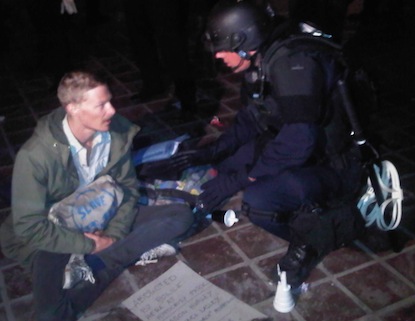 Of the dozen or so people who were soon to be arrested on 1st Street, a disproportionate number of us (half) had only just arrived on the scene. Several told me later that they had never before set foot in the Occupy LA camp, but had come to observe or provide moral support for the movement on what they feared might be their last opportunity to do so. In the chaotic seconds before my arrest, I was typing in the caption for a live tweet photo, and was late to lift my head when hundreds of people began sprinting west toward Los Angeles Street. I instantly recognized that they were trying desperately to outrun dozens of police officers who were also running west, along the north and the south sides of the street, in order to enclose us on all sides. The vast majority of the protesters were able to outrun the officers, and get into the intersection of 1st and Los Angeles Streets before a scrimmage line closed off the block. I chose not to run for fear that I’d be tackled and injured in the process. I saw people try to break through the perimeter and get pushed back somewhat violently, confirming my instinct that it was safer not to run.
Of the dozen or so people who were soon to be arrested on 1st Street, a disproportionate number of us (half) had only just arrived on the scene. Several told me later that they had never before set foot in the Occupy LA camp, but had come to observe or provide moral support for the movement on what they feared might be their last opportunity to do so. In the chaotic seconds before my arrest, I was typing in the caption for a live tweet photo, and was late to lift my head when hundreds of people began sprinting west toward Los Angeles Street. I instantly recognized that they were trying desperately to outrun dozens of police officers who were also running west, along the north and the south sides of the street, in order to enclose us on all sides. The vast majority of the protesters were able to outrun the officers, and get into the intersection of 1st and Los Angeles Streets before a scrimmage line closed off the block. I chose not to run for fear that I’d be tackled and injured in the process. I saw people try to break through the perimeter and get pushed back somewhat violently, confirming my instinct that it was safer not to run.
My final two live tweets showed my view to the west, where my path to safety had been closed off, and my view to the east, where hundreds more officers were marching directly toward me. Seconds before I was placed under arrest, I tweeted out a photo accompanied by the caption: “Wall of police coming at me. This is scary.”
If anyone is considering getting arrested by a wall of police, I don’t recommend it. You are likely to get the officers who are most affected by their adrenaline, and most eager to get their hands on somebody, as was the case for me. The amount of force used by the two arresting officers in placing my hands behind by back didn’t really phase me. Being forceful during this procedure helps reduce the percentage of people who decide to resist arrest, thus making everyone involved more safe. I had no intention of resisting, of course, and I said “I am not resisting” several times as they jostled me around and bent my wrists in way that was mildly painful.
I never got the names of my arresting officers (and neither did the LAPD as it turned out). When I was being searched, one of them grabbed my groin deliberately. I later asked about this, and was told it was procedure, given that some people get arrested on purpose in order to try to smuggle weapons into jail, and, that there are horror stories of suspects put into the backs of squad cars with a .25 pistol hidden on their person with deadly results. Subsequent searches were less frantic and less intrusive.
The handcuffs they put on me were made of white plastic. They were basically zip ties known as FlexiCuffs. The officers pulled them very, very tight around my wrists. I was escorted through a maze of police officers back to the corner of 1st and Main and told to sit on the curb. There were 10 or 12 of us I’d say, all sitting in a row. A 20-year-old college student had been placed next to me. She told me she had not intended to get arrested, and that she was experiencing great discomfort with the ligatures binding her wrists. The woman next to her was about the same age. She complained repeatedly about the discomfort of the FlexiCuffs. About then I realized that my own restraints were cutting off circulation to my hands, and, the pain of the plastic pushing into my skin was increasing with time. Officers either ignored the complaints, or responded with empathy that there was nothing they could do to help them. I heard one officer say that the handcuffs would be removed before we were loaded on the bus, but as it turned out, they were not.
Some of the arrestees were suspicious of the police. They refused to give their social security numbers, for instance, asking “Why is that information necessary?” My sense was that their distrust of law enforcement came from the same place as many of the other occupiers I have met in different cities. It was based primarily upon acts of police brutality captured on video at other occupy camps, and the general view that even those police officers who were not prone to violence were doing the bidding of a corrupt government determined to prevent them from exercising their Constitutional rights.
Before entering the bus, I was searched for the third time. The bus did not have windows, but at the very top of its walls you could see through the air holes, or whatever sort of holes they were, in the metal. The bus was split into three sections. The back section had benches and a metal wall with a door that locked. The middle section, into which I was placed, was larger but similar. And the front section had small cells large enough for two people maximum. Of the 40 or 50 people on the bus, only a dozen were women, and, all of the women were in the small holding cells. In a glance I could tell which of the men had been prepared to get arrested, and which were completely stunned to find themselves in this situation. The former, of which there were more, were defiant and almost jubilant. A few of them said they had been yanked out of trees by police officers using poles and, in one case, a crane. Others said they had been sleeping in tents earlier in the evening and arrested very suddenly and without an opportunity to leave on their own. The woman in the small holding cell in front of me was 19-year-old Carina Reyes, who recently dropped out of LA City College. She lived around the corner from the camp but often slept there in a tent to show solidarity with her brothers and sisters. She was among the first to be arrested after the police entered the camp. She was chosen at random, apparently, in order to make an example to others being offered an opportunity to leave on their own. David Payant, 25, had decided to come to City Hall on a lark with a group of friends, just to check things out, and had only just arrived when he got arrested. I met several others who told me the same.
We stayed on the bus for about 20 minutes, perhaps longer before moving. During this time, we could look into the camp and see that there was very little action at this point. There were some searches going on to make sure no one was missed. And, there were police officers in what looked like Stay Puffed Marshmallow Man suits standing in a circle talking to one another. I was later told by an indignant occupier that the Marshmallow suits were intended to imply that the camp was a bio hazard, and, that media reports had run with the bio hazard story using Marshmallow suits as visual illustrations, even though there was no other evidence. (In two visits to the camp, I saw no signs of bio hazards, but I admit I dont know what a bio hazard looks like.)
The bus finally moved and we drove for less than 2 minutes before stopping at the downtown LAPD station’s loading dock. We waited there for a long time, perhaps another 20 minutes, watching as the bus ahead of us was off-loaded and its occupants searched and processed. Then, suddenly, the bus was moving again, and this time we drove for a long while. We could not see forward, but we could see out the sides as I mentioned, and a few of us stood up in order to do so. “We’re getting on the freeway,” one man said. “We’re passing Universal City,” said another. Fifteen minutes later I heard, “I see a 76 gas station” and “We’re on Van Nuys Blvd.”
When we arrived at the Van Nuys station, we’d already been on the bus for more than an hour. There was a woman calling for medical attention near the front of the bus, but she was ignored by the LA Sheriffs Deputy who was in charge. For a time, we assumed he couldn’t hear her. And so, at Carina’s request, I asked the men in my section to yell about it. They did, loudly, but still no response. (It is my judgment, by the way, that this woman did not actually need medical attention. However, I would have preferred to see the deputy at least respond to her.) People continued to complain about their handcuffs. One man, who had a high-pitched voice, talked about his pain every 20 minutes or so. Another man, one of those who’d been pulled out of a tree, finally said, “Mine hurt too but, you know, the sound of your whining makes me want to barf.”
There were two men on the bus who were becoming increasingly agitated. Neither were in my section. One was alone in the narrow holding cell closest to the front of the bus. He was the only man in such a cell. He yelled a lot, and even threatened one of the men in my section. Another man in the back was also yelling a lot, and at different times each of them pounded on the metal doors that imprisoned them making a deafening noise. There were at least two men on the bus who pleaded with the others not to act up, fearing that the extra noise would prolong our ordeal.
By this time, my wrists were really hurting too. I taught myself meditation techniques on the spot and they actually helped. Little did we know that our wait inside this bus was only half over. We spent another hour just sitting there waiting to be off-loaded. During this time, there were several instances when it sounded as if the bus door was opening and the Sheriffs Deputies were at last coming back for us. But, a second later, I would realize it was just one of my fellow arrestees bumping up against the metal wall. I noticed that during that second of hope, the ligatures on my wrists didn’t hurt as much, and, I found myself wishing that another person would bump up against the walls of the bus so I could again be fooled and again have a momentary reprieve from the pain.
P.S. 2011: I apologize for not writing about being in jail as I promised. Jail was really not that eventful compared to what you have read above. I am not angry at the LAPD, and I did not intend for my writing to cause others to be angry. I’m simply sharing what happened. I will develop some commentary later. Although I’ve had little time to process it, I don’t think that this experience will change my feelings toward the law enforcement profession, or those who choose to serve in it, which have been very positive since the filming of 9500 Liberty in 2007 and 2008. Let’s not make sweeping accusations against LAPD or law enforcement in general as a way of expressing compassion for, or solidarity with, the Occupy movement. Saying “I am against the police” is not a way of saying “I am for the Occupiers.” As I have heard many protesters say over the past few months, “We are all part of the 99%.”
P.S. 2015: I also wrote about the political implications of using police to suppress speech in 2011, but in the context of #BlackLivesMatter, I wrote this on my FB page on April 4, 2015:
My problem with all of it boils down to 2 things:
(1) Police work is an expression of government, and when government endeavors to stifle or, in this case, end political expression, there should be public outcry, I don’t care what your television tells you to think.
And, (2) when government expresses its will upon the People via a show of force, whether a display of military might, or, imposing physical discomfort such as what I describe, the People need to understand how powerful this is, and ask why the government decided to take this action, and, upon whose behalf.
![]()
Please support Story of America with a tax deductible donation.
